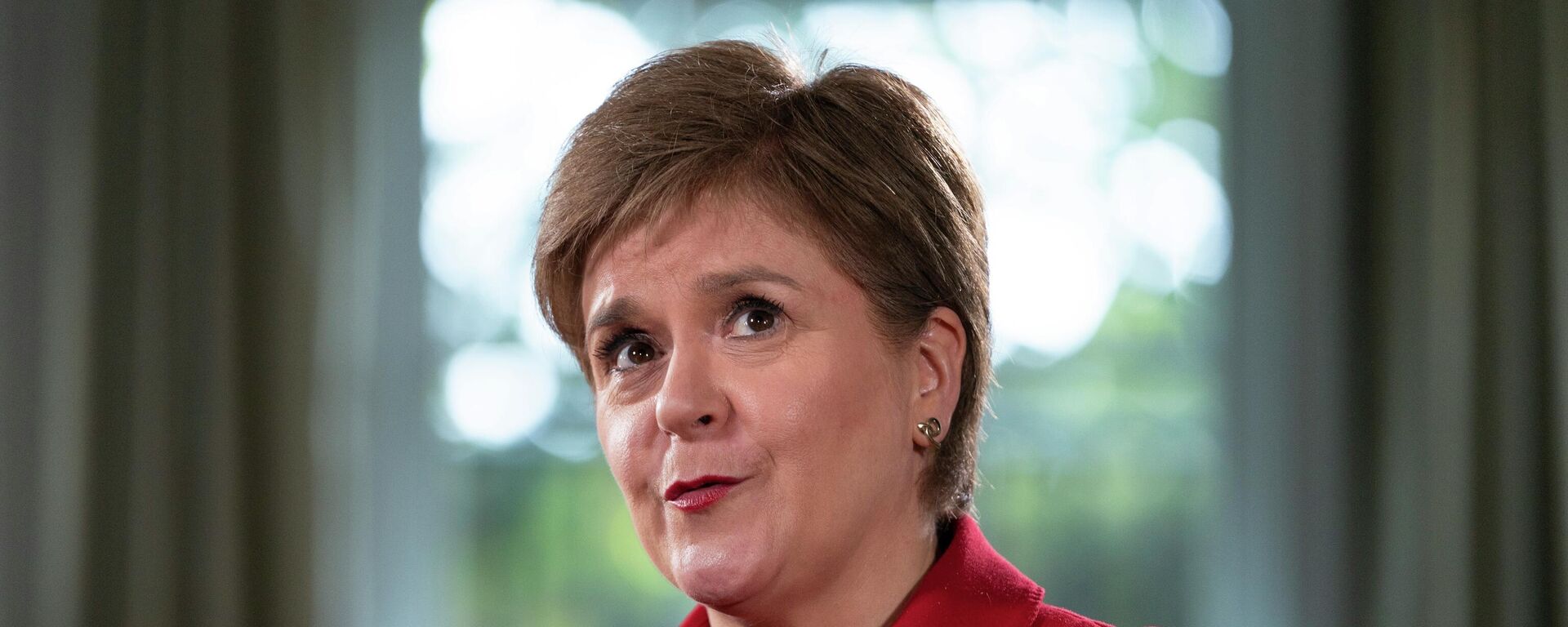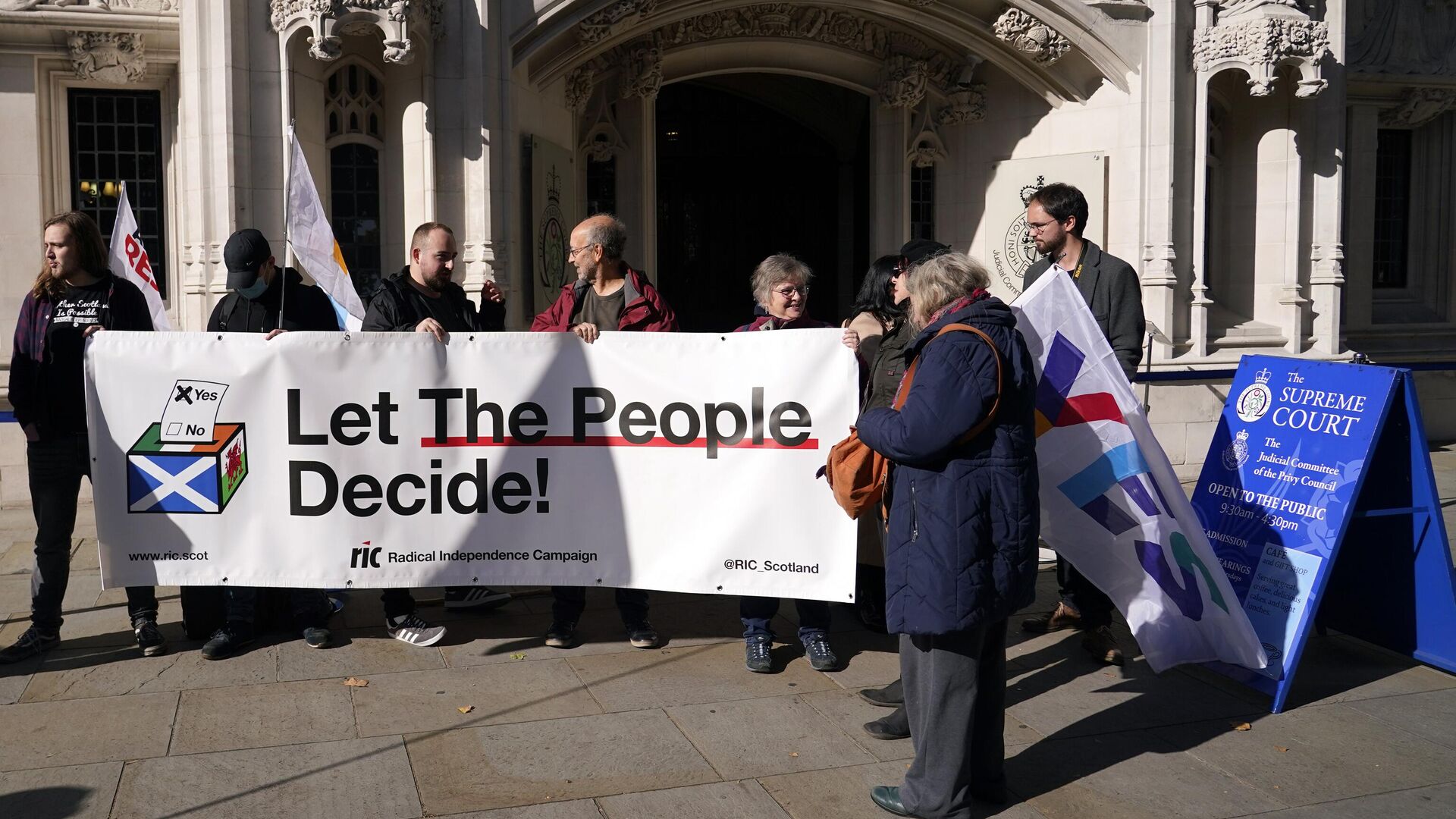https://sputnikglobe.com/20221123/uk-supreme-court-rules-scotland-cannot-hold-second-independence-referendum-1104576214.html
UK Supreme Court Rules Scotland Cannot Hold Second Independence Referendum
UK Supreme Court Rules Scotland Cannot Hold Second Independence Referendum
Sputnik International
The Scottish National Party claim that the majority of Scots who voted against Brexit would back secession from the UK in a repeat of the 2014 independence... 23.11.2022, Sputnik International
2022-11-23T09:59+0000
2022-11-23T09:59+0000
2023-05-28T15:25+0000
world
europe
scotland
supreme court
scottish nationalist party (snp)
boris johnson
britain
great britain
scottish independence
indyref 2.0
https://cdn1.img.sputnikglobe.com/img/07e6/0b/17/1104577188_0:282:3073:2010_1920x0_80_0_0_bb30cad82120eb5b1a13bded8db04719.jpg
The UK's Supreme Court has ruled that Scotland's devolved parliament cannot legislate to hold a second independence referendum without Westminster's approval.The unanimous decision, delivered by the court's president Lord Reed on Wednesday morning, effectively kills off the Scottish National Party (SNP) bid for a separatist plebiscite with the aim of re-joining the European Union (EU).he rejected the Scottish administration's argument that the issue was not "reserved" for the UK government and Westminster Parliament because the result of the vote would not necessarily be in favour of secession, adding that the "material effect" of the move had to be considered alongside its "legal effect".He also dismissed the SNP's comparison of Scotland to the breakaway Serbian province of Kosovo — which unilaterally declared independence in 2008 without holding a referendum, nine years after the US-led war on Serbia that resulted in its occupation by NATO forces.The law lord said no section of the population in Scotland was denied access to government, as in the example of Quebec in Canada which was also raised, and therefore the Scottish nationalists could not claim the right to self-determination.Reed noted that the 1998 Scotland Act that granted devolution only gives the Scottish Parliament "limited powers."The case was brought to the Supreme Court by Dorothy Bain KC, the Scottish Lord Advocate — a member of SNP First Minister Nicola Sturgeon's cabinet whose office combines the powers of attorney-general and director of public prosecutions.Sturgeon tweeted that she was "disappointed" by the ruling, but claimed that the Supreme Court "doesn't make law, only interprets it."The Supreme Court's highest-profile ruling before Wednesday was its 2019 decision that the Conservative government of former prime minister Boris Johnson had given "unlawful advice" to late Queen Elizabeth II when it asked her to prorogue Parliament for a fortnight that September during sensitive negotiations on the EU withdrawal agreement.That ruling, which was supported by the SNP, saw the court grant itself power over the business of Parliament in contradiction of the 1689 Bill of Rights At, a central plank of British constitutional law.Johnson and his successors Liz Truss and Rishi Sunak have refused to allow a re-run to the 2014 referendum which saw secession rejected by 55 per cent of voters. The main opposition Labour Party has also recently ruled out granting another plebiscite in return for SNP support in forming a coalition government following the next general election.But like Sinn Fein in Northern Ireland, the nationalists claim that the majority of Scots who voted against Brexit in the 2016 UK-wide referendum would now back independence — only to sign their sovereignty away to Brussels.
https://sputnikglobe.com/20221024/scottish-leader-demands-early-election-says-would-not-vote-for-sunak-if-given-chance-1102589129.html
scotland
britain
great britain
united kingdom (uk)
Sputnik International
feedback@sputniknews.com
+74956456601
MIA „Rossiya Segodnya“
2022
James Tweedie
https://cdn1.img.sputnikglobe.com/img/07e4/08/1c/1080307270_0:3:397:400_100x100_80_0_0_7777393b9b18802f2e3c5eaa9cbcc612.png
James Tweedie
https://cdn1.img.sputnikglobe.com/img/07e4/08/1c/1080307270_0:3:397:400_100x100_80_0_0_7777393b9b18802f2e3c5eaa9cbcc612.png
News
en_EN
Sputnik International
feedback@sputniknews.com
+74956456601
MIA „Rossiya Segodnya“
Sputnik International
feedback@sputniknews.com
+74956456601
MIA „Rossiya Segodnya“
James Tweedie
https://cdn1.img.sputnikglobe.com/img/07e4/08/1c/1080307270_0:3:397:400_100x100_80_0_0_7777393b9b18802f2e3c5eaa9cbcc612.png
europe, scotland, supreme court, scottish nationalist party (snp), boris johnson, britain, great britain, scottish independence, indyref 2.0, united kingdom (uk)
europe, scotland, supreme court, scottish nationalist party (snp), boris johnson, britain, great britain, scottish independence, indyref 2.0, united kingdom (uk)
UK Supreme Court Rules Scotland Cannot Hold Second Independence Referendum
09:59 GMT 23.11.2022 (Updated: 15:25 GMT 28.05.2023) The Scottish National Party claim that the majority of Scots who voted against Brexit would back secession from the UK in a repeat of the 2014 independence vote — which the nationalists lost by a wide margin.
The UK's Supreme Court has ruled that Scotland's devolved parliament cannot legislate to hold a second independence referendum without Westminster's approval.
The
unanimous decision, delivered by the court's president Lord Reed on Wednesday morning, effectively kills off the
Scottish National Party (SNP) bid for a separatist plebiscite with the aim of re-joining the European Union (EU).
he rejected the Scottish administration's argument that the issue was not "reserved" for the UK government and Westminster Parliament because the result of the vote would not necessarily be in favour of secession, adding that the "material effect" of the move had to be considered alongside its "legal effect".
"The Court unanimously concludes that the proposed bill does relate to reserved matters," Reed said. "Accordingly, in the absence of, any modification of the definition of reserved matters by an order in council under Section 30 of the Scotland Act or otherwise, the Scottish Parliament does not have the power to legislate for a referendum on Scottish independence."
He also dismissed the SNP's comparison of Scotland to the breakaway Serbian province of Kosovo — which unilaterally declared independence in 2008 without holding a referendum, nine years after the US-led war on Serbia that resulted in its occupation by NATO forces.
The law lord said no section of the population in Scotland was denied access to government, as in the example of Quebec in Canada which was also raised, and therefore the Scottish nationalists could not claim the right to self-determination.
Reed noted that the 1998 Scotland Act that granted devolution only gives the Scottish Parliament "limited powers."
"The Scottish Parliament has no power to legislate in relation to matters that are reserved to the United Kingdom Parliament at Westminster," he said. "Those reserved matters include fundamental aspects of the Constitution of the United Kingdom, including the Union of Scotland and England and, the United Kingdom Parliament."
The case was brought to the Supreme Court by Dorothy Bain KC, the Scottish Lord Advocate — a member of SNP First Minister
Nicola Sturgeon's cabinet whose office combines the powers of attorney-general and director of public prosecutions.
Sturgeon
tweeted that she was "disappointed" by the ruling, but claimed that the Supreme Court "doesn't make law, only interprets it."
"A law that doesn't allow Scotland to choose our own future without Westminster consent exposes as myth any notion of the UK as a voluntary partnership and makes case for Independence," Sturgeon posted.

24 October 2022, 16:18 GMT
The Supreme Court's highest-profile ruling before Wednesday was its 2019 decision that the Conservative government of former prime minister Boris Johnson had given "unlawful advice" to late Queen Elizabeth II when it asked her to prorogue Parliament for a fortnight that September during sensitive negotiations on the EU withdrawal agreement.
That ruling, which was supported by the SNP, saw the court grant itself power over the business of Parliament in contradiction of the 1689 Bill of Rights At, a central plank of British constitutional law.
Johnson and his successors Liz Truss and Rishi Sunak have
refused to allow a re-run to the 2014 referendum which saw secession rejected by 55 per cent of voters. The main opposition Labour Party has also recently ruled out granting another plebiscite in return for SNP support in forming a coalition government following the next general election.
But like Sinn Fein in Northern Ireland, the nationalists claim that the majority of Scots who voted against Brexit in the 2016 UK-wide referendum would now back independence — only to sign their sovereignty away to Brussels.




